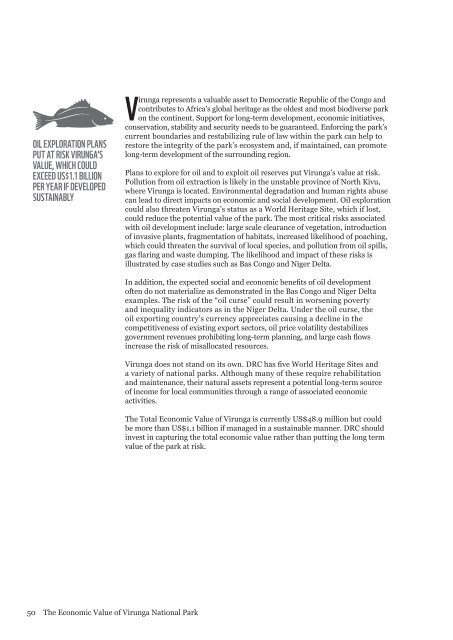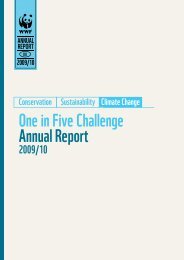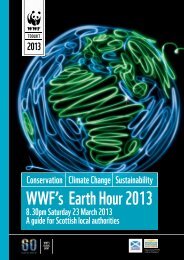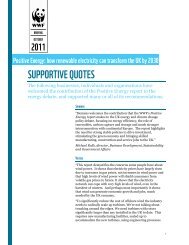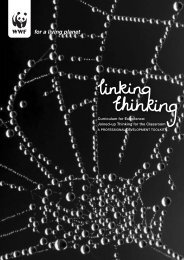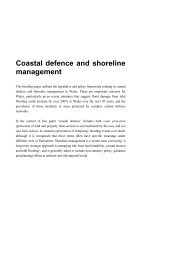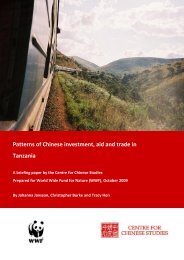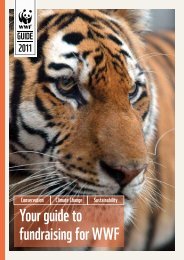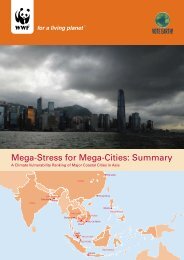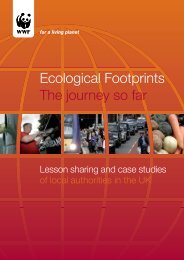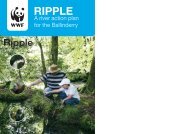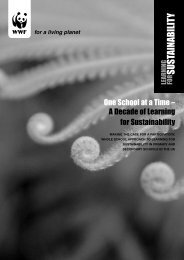OIL EXPLORATION PLANSPUT AT RISK VIRUNGA’SVALUE, WHICH COULDEXCEED US$1.1 BILLIONPER YEAR IF DEVELOPEDSUSTAINABLY<strong>Virunga</strong> represents a valuable asset to Democratic Republic <strong>of</strong> the Congo andcontributes to Africa’s global heritage as the oldest and most biodiverse parkon the continent. Support for long-term development, economic initiatives,conservation, stability and security needs to be guaranteed. Enforcing the park’scurrent boundaries and restabilizing rule <strong>of</strong> law within the park can help torestore the integrity <strong>of</strong> the park’s ecosystem and, if maintained, can promotelong-term development <strong>of</strong> the surrounding region.Plans to explore for oil and to exploit oil reserves put <strong>Virunga</strong>’s value at risk.Pollution from oil extraction is likely in the unstable province <strong>of</strong> North Kivu,where <strong>Virunga</strong> is located. Environmental degradation and human rights abusecan lead to direct impacts on economic and social development. Oil explorationcould also threaten <strong>Virunga</strong>’s status as a <strong>World</strong> Heritage Site, which if lost,could reduce the potential value <strong>of</strong> the park. <strong>The</strong> most critical risks associatedwith oil development include: large scale clearance <strong>of</strong> vegetation, introduction<strong>of</strong> invasive plants, fragmentation <strong>of</strong> habitats, increased likelihood <strong>of</strong> poaching,which could threaten the survival <strong>of</strong> local species, and pollution from oil spills,gas flaring and waste dumping. <strong>The</strong> likelihood and impact <strong>of</strong> these risks isillustrated by case studies such as Bas Congo and Niger Delta.In addition, the expected social and economic benefits <strong>of</strong> oil development<strong>of</strong>ten do not materialize as demonstrated in the Bas Congo and Niger Deltaexamples. <strong>The</strong> risk <strong>of</strong> the “oil curse” could result in worsening povertyand inequality indicators as in the Niger Delta. Under the oil curse, theoil exporting country’s currency appreciates causing a decline in thecompetitiveness <strong>of</strong> existing export sectors, oil price volatility destabilizesgovernment revenues prohibiting long-term planning, and large cash flowsincrease the risk <strong>of</strong> misallocated resources.<strong>Virunga</strong> does not stand on its own. DRC has five <strong>World</strong> Heritage Sites anda variety <strong>of</strong> national parks. Although many <strong>of</strong> these require rehabilitationand maintenance, their natural assets represent a potential long-term source<strong>of</strong> income for local communities through a range <strong>of</strong> associated economicactivities.<strong>The</strong> Total <strong>Economic</strong> <strong>Value</strong> <strong>of</strong> <strong>Virunga</strong> is currently US$48.9 million but couldbe more than US$1.1 billion if managed in a sustainable manner. DRC shouldinvest in capturing the total economic value rather than putting the long termvalue <strong>of</strong> the park at risk.50 <strong>The</strong> <strong>Economic</strong> <strong>Value</strong> <strong>of</strong> <strong>Virunga</strong> <strong>National</strong> <strong>Park</strong>
NOTES1. Ministry <strong>of</strong> Environment, Conservation and Tourism. 2011. Congolese Government SuspendsOil Exploration to Secure Mountain Gorilla <strong>Park</strong>, http://gorillacd.org/2011/03/17/government-press-release-congolese-government-suspends-oil-exploration-to-securemountain-gorilla-park2. UNESCO <strong>World</strong> Heritage Committee. Nomination <strong>of</strong> Natural, Mixed and CulturalProperties to the <strong>World</strong> Heritage List – <strong>Virunga</strong> <strong>National</strong> <strong>Park</strong>, http://whc.unesco.org/en/decisions/13773. <strong>The</strong> Albertine Rift is the western branch <strong>of</strong> the East African Rift, covering parts <strong>of</strong> Uganda,the Democratic Republic <strong>of</strong> the Congo (DRC), Rwanda, Burundi and Tanzania. <strong>The</strong> northernpart <strong>of</strong> the rift is crossed by two large mountain ranges, the Rwenzori Mountains betweenLake Albert and Lake Edward, and the <strong>Virunga</strong> Mountains between Lake Rutanziga and LakeKivu.4. UNESCO. Description <strong>of</strong> <strong>Virunga</strong> <strong>National</strong> <strong>Park</strong>, http://whc.unesco.org/en/list/635. Known as “taxa” in biological terms; Kakir, L.M. 2010. Monitoring Law EnforcementEfforts and Illegal Activity in Selected Protected Areas: Implications for Management andConservation, Democratic Republic <strong>of</strong> the Congo.6. Soco International PLC. 2013. Where is Block V? http://www.socointernational.co.uk/blockv-and-the-virunga-national-park,accessed January 2013.7. Ibid 1.8. SacOil Holdings Limited. 2012. Update on Block III, Albertine Graben, DRC, http://www.sacoilholdings.com/investors-and-media/company-announcements/update-on-block-iiialbertine-graben-drc/?id=14&entryId=229. Frankfurt Zoological Society. June 2012. No Oil Exploration in <strong>Virunga</strong>, http://www.zgf.de/?id=72&reportId=106&language=en10. Amiel, G. 2013. Total Rules Out Oil Exploration in Congo’s <strong>Virunga</strong> <strong>National</strong> <strong>Park</strong>, http://online.wsj.com/article/BT-CO-20130517-703772.html11. Soco International. 2012. What is the Context for Soco’s Presence in Eastern DRC?http://www.socointernational.co.uk/index.php?cID=block-v-and-the-virunga-nationalpark&tab=96212. Ibid.13. International Crisis Group. July 2012. Black Gold in the Congo: Threat to Stability orDevelopment Opportunity? http://www.crisisgroup.org/~/media/Files/africa/centralafrica/dr-congo/188-black-gold-in-the-congo-threat-to-stability-or-developmentopportunity-english.pdf14. UNEP. 2011. Environmental Assessmento <strong>of</strong> Ongoniland, Table 3, http://postconflict.unep.ch/publications/OEA/UNEP_OEA.pdf15. Alberta Centre for Boreal Studies. 2001. Fact Sheet: <strong>The</strong> Oil and Gas Industry in Alberta:Seismic Exploration, http://www.borealcentre.ca/facts/seismic.html16. African Natural Heritage. Selous Game Reserve in Tanzania. http://www.africannaturalheritage.org/Selous-Game-Reserve-Tanzania.html17. Llewellyn, R.O. 2011. Seismic Trails cut by U.S. oil firm in Belizean <strong>National</strong> <strong>Park</strong> used byIllegal Loggers, http://news.mongabay.com/2011/1206-belize_us_cap_energy_llewellyn.html18. Ibid 13.19. Cotter, J. 2003. Mahogany Logging Causes Fragmentation <strong>of</strong> the Brazilian Amazon, <strong>World</strong>Forest Congress, http://www.fao.org/docrep/article/WFC/XII/0553-B1.htm20. Blake, S., Douglas-Hamilton, I. and W.B. Karesh. 2001. GPS Telemetry <strong>of</strong> Forest Elephantsin Central Africa: Results <strong>of</strong> a Preliminary Study. African Journal <strong>of</strong> Ecology 39: 178-186.21. Tribal Energy and Environmental Information Clearinghouse (TEEIC). Oil and GasExploration Impacts http://teeic.anl.gov/er/oilgas/impact/explore/index.cfm<strong>The</strong> <strong>Economic</strong> <strong>Value</strong> <strong>of</strong> <strong>Virunga</strong> <strong>National</strong> <strong>Park</strong> 51


